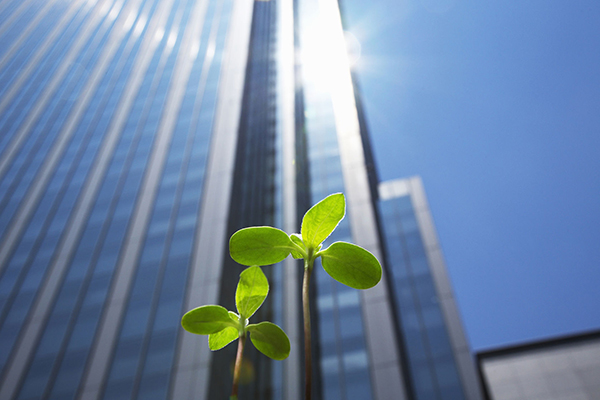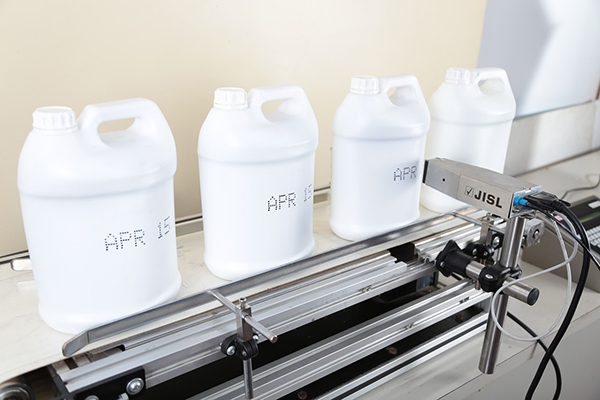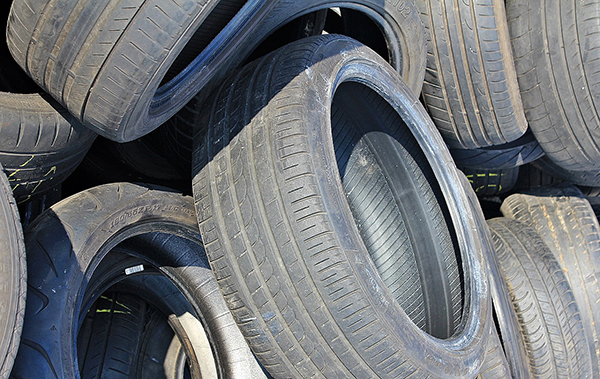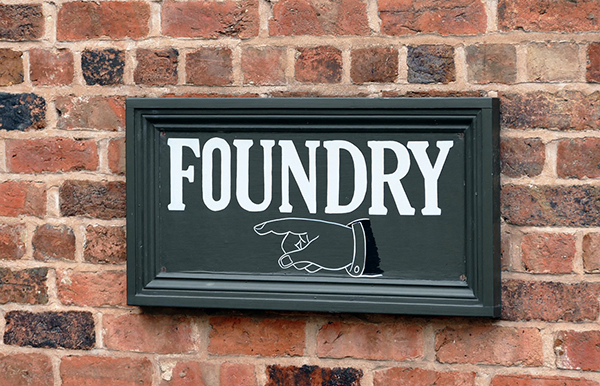
Without manufacturers producing green materials and technical solutions, the green building industry itself would not be sustainable.
From paint to insulation to cleaning products, some eco-friendly manufacturers are taking a holistic approach to production because they realize it’s not only the end product that should be energy efficient and sustainable. The materials used in production and the manufacturing process itself should be, too.
We’ve taken a look at 10 eco-friendly manufacturers who are doing great work, and doing it green.

Applegate Insulation
Used in both non-industrial, commercial properties as well as residential developments, Applegate Cellulose Insulation is made from up to 85 percent recycled paper fibers. It is
- a Class 1, Type A building material that qualifies for LEED certification points;
- is made in the USA;
- and is treated for fire resistance, meeting Consumer Product Safety Commission standards.
It is also formulated to be low dust, and its reduced air filtration keeps it from carrying airborne sound.
The Michigan-based, family-owned manufacturer has been in operation for nearly 40 years, and recently announced the opening of a new production facility near Phoenix, the seventh in the US (with another facility in Canada). “Across all cellulose insulation operations, Applegate is expected to recycle more than 2 million tons of fiber each month, which would otherwise go to landfills,” the company says.
IceStone
Transforming waste glass into beautiful countertop surfaces was how co-founders Miranda Magagnani and Peter Strugatz came to form IceStone in 2003. They wanted to design beautiful countertops using sustainable and responsible manufacturing practices, and have to date diverted more than 13 million pounds of glass from landfills, working from the Brooklyn Navy Yard in New York.
IceStone has a triple bottom line: People, planet and profit. With their recycled materials, non-toxic pigments and zero-waste facility goal, they’ve got the planet down. For the people category, empowered employees own 10 percent of the company, and CEO Dal LaMagna says those employee partners were instrumental in making sure the company survived Hurricane Sandy in 2012.
Crossville
Tennessee’s first tile manufacturer has been making tiles for residential and commercial applications since 1986. Recycling more than they produce, Crossville says the company has always been green, but instead of calling it a matter of sustainability, they saw the reduction of negative impacts on natural resources more as a matter of responsibility.
Their products are third-party certified by SCS Global Services, an environmental certification company, and they are the first manufacturer to earn the Tile Council of North America’s Green Squared certification.
Crossville recycles water in their manufacturing process and sources everything from raw materials to packaging within 350 miles of their operation. They accept previously installed fired porcelain for recycling and are the first large-scale manufacturer that can process that stock as new product.

Dinoflex
Located in British Columbia, Dinoflex has been making floors out of tires for more than 20 years. Recycling used rubber is environmentally friendly in two ways: it saves natural resources and keeps the rubber out of landfills. The Dinoflex manufacturing process does not pollute, and the recycled rubber is produced locally (within a 500-mile radius of the factory).
The company makes different types of rubber flooring, including NuVista Tiles, which can be used indoors or outside. The sustainable tiles are designed to be put together with an adhesive-free, interlocking system and do not crack in freezing conditions. They are water-permeable, impact-absorbing and noise-reducing, and they qualify for LEED credits.
The Wagner Companies
Started as a blacksmith shop in 1850, this family-owned business in Milwaukee manufactures metal products, including those used for handrails. Over the past decade, Wagner, led by CEO Bob Wagner, has been actively been implementing green business practices in its manufacturing practices. This includes:
- Recycling wood waste
- Replacing foam with air pouches for packaging
- Reducing energy consumption by nearly 28,000 kilowatt hours annually by replacing exterior lights with LEDs
The Wagner Companies also now offers products and components that qualify for LEED credits.
ArcelorMittal
The world’s largest steel manufacturer, ArcelorMittal, is getting greener. Last year, Forbes contributor Esha Chhabra reported that the company had partnered with LanzaTech and Primetals Technologies (a bioengineering firm and a technology and service provider, respectively) in order to convert waste gas into bioethanol, which could be used to fuel cars.
ArcelorMittal has also announced that it is now a member of the Institut Bauen und Umwelt (IBU) — the Institute of Construction and the Environment. “Joining the IBU gives ArcelorMittal reliable, worldwide recognition of the sustainability credentials of its steel products for the construction industry,” the company says.
The Old Fashioned Milk Paint Company
Old Fashioned Milk Paint—made from milk protein, crushed limestone, clay and earth pigments—carries the “USDA Certified Biobased Product” label, verifying that the paint’s ingredients meet or exceed USDA standards. The formula was recreated in 1974 by Massachusetts entrepreneur Charles Thibeau, and has been further developed by his daughter, Anne Thibeau, who is now president of the company.
Milk paint adheres to bare wood and plaster, is 100% biodegradable and contains no volatile organic compounds, making it safe for children, pregnant women and people with chemical sensitivities. The formula is in a powder format, which makes preservatives unnecessary and makes the product lightweight for shipping.
The newest product from The Old Fashioned Milk Paint Company is called SafePaint, and can be used on walls that have been previously painted and on new drywall.

Cool Clean Technologies
Cool Clean Technologies and its founder Jon Wikstrom have pioneered the use of recycled CO2 in liquid form for manufacturing and precision cleaning. The company says it has come up with a number of ways carbon dioxide can transform both manufacturing and cleaning processes that are environmentally friendly.
Partnering with the U.S. Department of Energy, the Air Force, the United Soybean Board and researchers from Augsburg College in Minneapolis and the University of Dayton, the company has developed technology for cleaner biofuels, machine coolants from soybean oil and other CO2 systems.
Biokleen
Family owned and operated, Biokleen is a manufacturer and supplier of plant- and mineral-based cleaning products. The company, based in Vancouver, Washington, has been making non-toxic, biodegradable cleaners for industrial, janitorial and household use since 1989.
No Biokleen products have been tested on animals, nor are animal ingredients used in any formulation. All Biokleen products are free of chlorine bleach, optical brighteners, synthetic colors and or artificial fragrances. The manufacturing takes place in a “Natural Products Only Facility,” which means nothing in its facility comes into contact with chemicals or any other materials that may be hazardous.
EcoStar
Manufactured with up to 80 percent recycled content, the synthetic roofing tiles by EcoStar are an eco-friendly alternative to traditional slate and natural cedar shake. Because the tiles are made from rubber and plastic, they are highly durable, offering Class 4 impact resistance, plus a 50-year and 100-mph-wind warranty.
The company is based in Holland, New York, and sees its steep slope roofing tiles used in commercial and residential applications. Some of the larger projects include the Monterey Bay Aquarium in California; the Semiahmoo Resort in Blaine, Washington; and educational facilities such as Ohio’s Austintown Library, Georgia’s Berry College and the Zach Elementary School in Ft. Collins, Colorado.
Credits:
pashminupixel2013
Inspired Images

